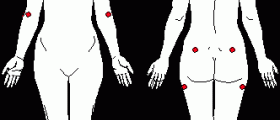
Fibromyalgia Facts
Fibromyalgia syndrome, FMS, fibrositis or fibromyalgia is a chronic condition which causes tenderness of the muscles, tendons and joints in the body, as well as the stiffness and pain. Patients suffering from this condition usually experience disabling pain but there is no damage to the organs or tissues in the body.
FMS should be distinguished from other similar problems such as rheumatoid arthritis, polyomyositis or systemic lupus. Although patients with these problems experience similar pain, there is also some inflammation, deformity and damage to different organs in the body. However, fibromyalgia patients don’t suffer from these problems. No one knows what is causing fibromyalgia in the first place. Doctors and scientists have been able only to identify the symptoms and determine the difference between this and above mentioned rheumatic conditions.
This medical condition usually affects women in the age group from 35 to 55, but it can lead to muscle pain in children, men and women, regardless their age.
Causes and Symptoms of Fibromyalgia
Scientists discovered that these patients have unexpectedly high level of the chemical known as the substance P (P as in Pain). This substance is responsible for the transduction of painful signals and elevated levels may be responsible for the pain patients feel. Other options include: increased level of nerve growth factor, decreased amount of serotonin or super-sensitivity of the brain also found in fibromyalgia patients. Various traumas and infections, as well as the psychological stress have been found to act as triggers for the onset of fibromyalgia pains.
Patients suffering from fibromyalgia frequently experience chronic fatigue, restless sleep and waking up feeling very tired. Many of them are faced with disturbances in the function of the bowels like irritable bowel syndrome (present in 90% of the cases), but also with depression and anxiety as these are problems known to accompany fibromyalgia. Symptoms of fibromyalgia may also include impaired rapid eye movement, leading to fatigue after sleep.
Fibromyalgia Treatment Options
So far, there is no diagnostic test for fibromyalgia available and doctors still don’t know what is causing this problem. Treatment usually includes education, proper exercise, stress management techniques and medications when necessary.
Scientists are currently developing the drugs to help people experiencing fibromyalgia pains. They are trying to find something that can block substance P or to affect nerve growth factor, hoping that these newly developed medications might be helpful for patients suffering from fibromyalgia.

















Your thoughts on this
Loading...